| Archived Summer Tutorials: | 2012 (no tutorial) | 2012 | 2011 | 2010 | 2009 | 2008 | 2007 | 2006 | 2005 | 2004 | 2003 | 2002 | 2001 |
Welcome Message
The summer tutorial program offers some interesting mathematics to
those of you who will be in the Boston area during July and August.
The tutorial will run for six weeks,
meeting twice or three times per week in the evenings (so as not to
interfere with day time jobs). The tutorial will start early in July
or late in June, and run to mid August. The precise starting dates
and meeting times will be arranged for the convenience of the
participants once the tutorial roster is set.
The format will be much like that of the term-time tutorials, with
the tutorial leader lecturing in the first few meetings and students
presenting later on. Unlike the term -time tutorials, the summer tutorials
have no official Harvard status: you will not receive either Harvard or
concentration credit for them. Moreover, enrollment in the tutorial
does not qualify you for any Harvard-related perks (such as a place
to live). However, the Math Department will pay each Harvard College
student participant a stipend of approximately $700, and you can hand
in your final paper from the tutorial for you junior paper requirement for the Math Concentration.
The topic and leader of tutorial this summer are:
|
|
A description of each topic is appended below. You can sign up for a
tutorial only by emailing me at kronheim@math.harvard.edu. When you
sign up, please list at least one other choice, if possible, in case
your preferred tutorial is either over-subscribed or under-subscribed.
Places are filled on a first-come, first-served basis, but with
priority being given to math concentrators. In the past, some
tutorials have filled up quickly.
If you have further questions about any given topic, contact the
tutorial leader via email. Please contact me if you have questions
about the administration of the tutorials.
Yours,
Peter Kronheimer
Mathematical Origami, by Erick Knight (eknight@math.harvard.edu)
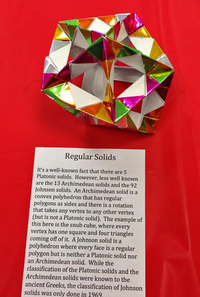
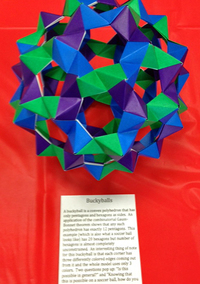
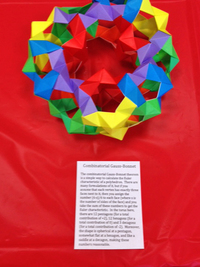
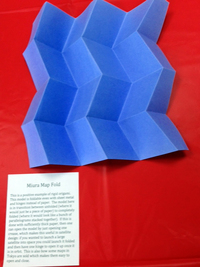
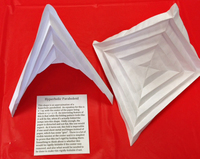
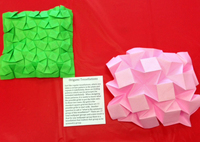 Gallery of projects done in this tutorial 2014
Gallery of projects done in this tutorial 2014
Origami is the Japanese art of folding paper. Traditionally, the aim has been to produce paper sculptures. The most well known example of this is the crane, but there are also traditional constructions of butterflies, frogs, good-luck charms, and many other things. More recently, some people brought tons of sophistication onto the subject as well and have figured out how to fold incredibly complicated structures; my personal favorite example is a chess board folded out of one sheet of paper that has white and black squares, and the most famous example is Kamiya's dragon which is also made from one sheet of paper and has on the order of 1000 individual scales. There has also been more mathematical shapes that are folded: most notably are polyhedra, but there are some other shapes that have been given physical realization as well. Mathematical origami is exactly what it sounds like: using mathematical techniques to study what can be done with origami. This is a very young subject and not directed or organized in a nice manner. The tutorial will be structured as follows: in the first two weeks, there will be lectures by me about what crease diagrams can be folded, as well as some lectures more about geometry using origami to get visual models of objects and giving a very hands-on approach to some theorems about polyhedra. There will also be some time for just practicing folding and making assorted origami objects. In the second half of the course, the students will prepare lectures on assorted topics about mathematical origami and write a paper about this.
Prerequisites: The prequisites for this tutorial are minimal. The main things that are needed is familiarity with high school geometry and the ability to read mathematical papers. There is no need to know anything about origami before the course: all the necessary things about origami will be taught in the course.
Archive: Old Summer Tutorials, since 2001
| Summer Tutorials: | 2012 | 2011 | 2010 | 2009 | 2008 | 2007 | 2006 | 2005 | 2004 | 2003 | 2002 | 2001 |
|
|